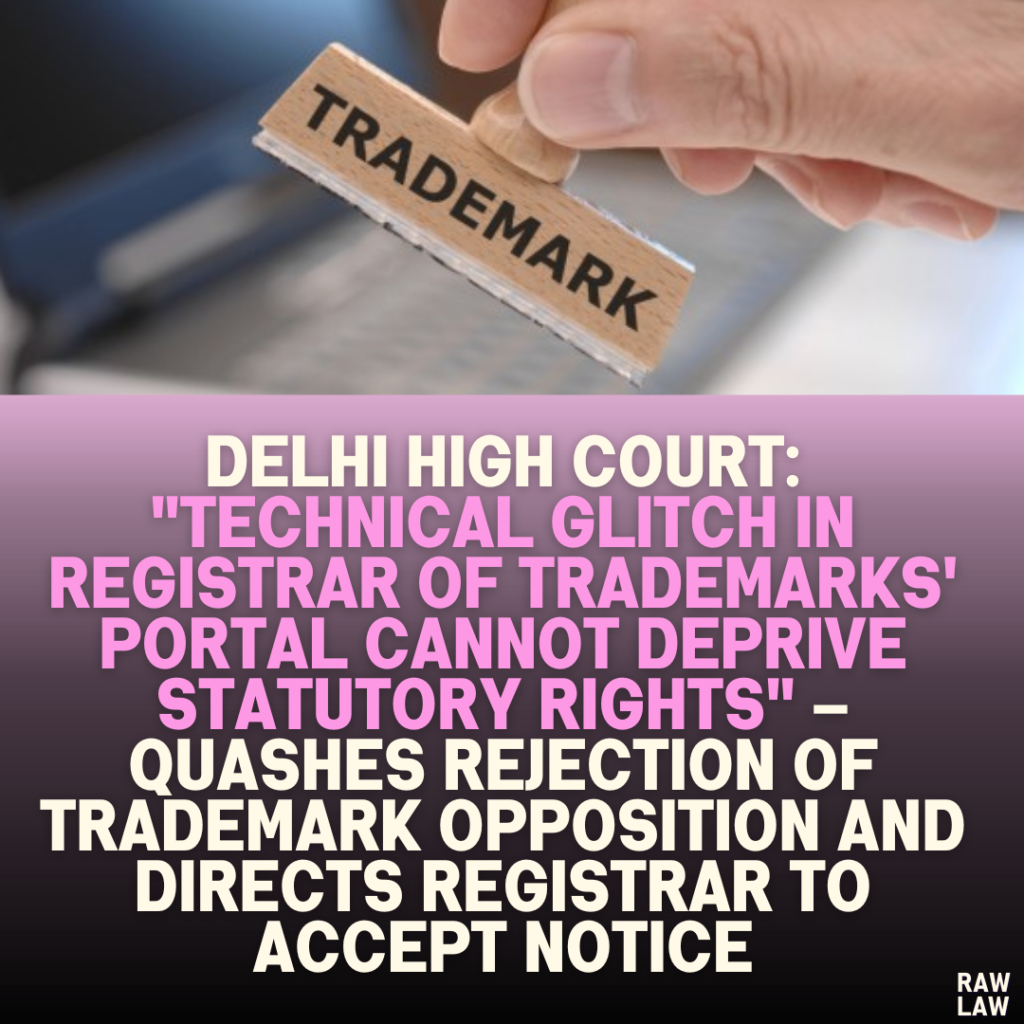Court’s Decision:
The Delhi High Court quashed the Registrar of Trademarks’ decision to reject the petitioner’s Notice of Opposition on the ground that it was time-barred. The court directed the Registrar to accept the opposition notice and proceed as per the law, emphasizing that the petitioner’s statutory rights cannot be denied due to technical glitches or procedural lapses in the online filing system.
Facts:
- Trademark Ownership:
The petitioner is the registered owner of the trademark ‘DECOR PLY,’ under Class 19, which covers products like plywood, flush doors, and building materials. This trademark has been in continuous use since 2010. - Conflicting Trademark Application:
The petitioner discovered a trademark application for the mark ‘R3 DÉCOR,’ which they believed was visually, phonetically, and structurally similar to their registered trademark. - Registrar’s Acceptance and Opposition Deadline:
- The conflicting trademark application was accepted and published in the Trade Mark Journal dated 15th April 2024.
- The statutory deadline to file a notice of opposition against this trademark was 16th August 2024, extended by one day as 15th August 2024 was a national holiday.
- Technical Glitch:
- On 16th August 2024, the petitioner attempted to file the opposition notice through the Registrar’s online portal.
- The portal displayed a message that the deadline had lapsed, preventing the petitioner from filing online.
- Physical Filing:
- Unable to file online, the petitioner sent the opposition notice via Speed Post, with a bank draft of ₹3,000 as the filing fee, prepared on the same day.
- The Registrar received the notice on 19th August 2024.
- Registrar’s Rejection:
- The Registrar issued a letter dated 20th August 2024, rejecting the opposition notice as time-barred, citing that the documents were received beyond the statutory deadline.
Issues:
- Whether a technical glitch in the Registrar’s online portal justifies the rejection of the petitioner’s notice of opposition.
- Whether procedural delays caused by postal services can deprive a party of their statutory rights.
- Whether the rejection violated the principle of natural justice, given that the petitioner made every reasonable effort to comply with the deadline.
Petitioner’s Arguments:
- Technical Glitch:
The petitioner argued that they were prevented from filing the notice online due to a technical error in the Registrar’s portal, which wrongly indicated that the deadline had lapsed. - Compliance with Deadline:
Despite the technical issue, the petitioner ensured physical submission of the notice and payment of fees on 16th August 2024, the last permissible day. - Fairness and Equity:
The petitioner contended that delays caused by postal services or administrative errors should not render their opposition invalid, as this would unjustly deprive them of their statutory rights.
Respondent’s Arguments:
- Rule 14 of the Trade Mark Rules, 2017:
The respondent relied on Rule 14, which states that documents sent via post are deemed submitted when received, not when dispatched. - Time-Barred Submission:
Since the petitioner’s opposition notice was received on 19th August 2024, three days after the statutory deadline, the Registrar argued that it was time-barred and rightly rejected. - Portal Functionality:
The respondent acknowledged the technical glitch but argued that the petitioner should have taken timely action to avoid such issues.
Analysis of the Law:
- Rule 14 Interpretation:
Rule 14 specifies that documents sent by post are valid only upon receipt within the statutory period. However, the court emphasized that procedural timelines must be balanced against the principle of equity. - Technical Glitches and Justice:
The court recognized that technical glitches are beyond the control of litigants and should not operate to deprive them of statutory rights. - Responsibility of Authorities:
The court held that public authorities, like the Registrar, have a duty to maintain functional systems and provide remedies for errors that obstruct compliance with statutory procedures.
Precedent Analysis:
The court referenced the broader legal principle that administrative inefficiencies or technical failures should not penalize litigants. Previous rulings in similar cases have underscored that statutory rights must be safeguarded from procedural hurdles caused by systemic lapses.
Court’s Reasoning:
- Acknowledgment of Technical Glitch:
The court noted that the respondent did not deny the existence of a technical glitch in their online portal. - Petitioner’s Due Diligence:
The petitioner acted diligently by attempting to file online and later submitting the notice physically within the statutory deadline. - Equity over Procedure:
The court held that rejecting the opposition notice due to procedural lapses would unjustly deprive the petitioner of their statutory rights. Delays caused by postal services or administrative errors cannot be attributed to the petitioner.
Conclusion:
The court quashed the Registrar’s rejection letter dated 20th August 2024 and directed the Registrar to:
- Accept the petitioner’s Notice of Opposition.
- Proceed with the opposition application in accordance with the law.
Implications:
- Safeguarding Statutory Rights:
This judgment reinforces that procedural inefficiencies or technical errors should not deprive individuals of their statutory entitlements. - Accountability of Public Authorities:
It highlights the responsibility of authorities to maintain efficient systems and address errors promptly to ensure fairness and justice. - Guidance for Future Cases:
The ruling provides a precedent for dealing with procedural challenges caused by technical glitches or postal delays.
